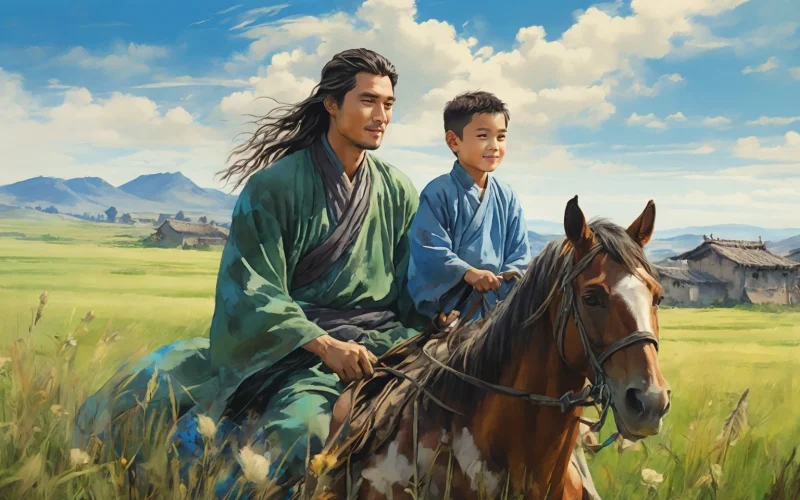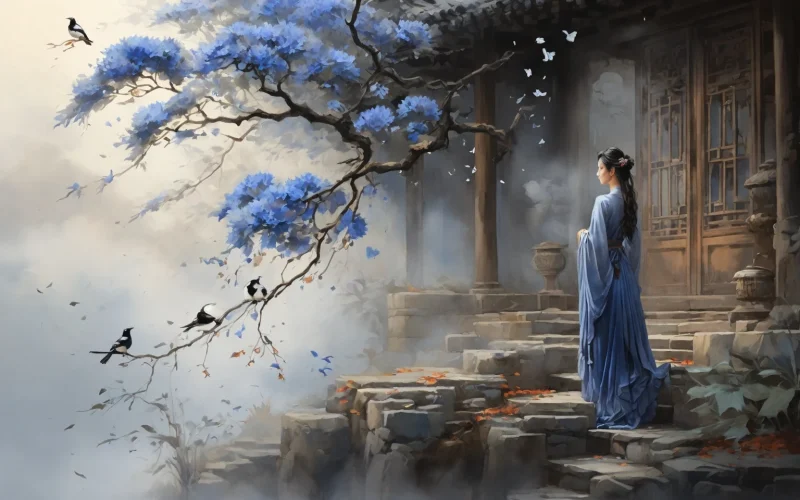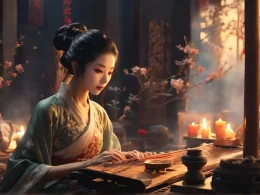From the two princesses of ancient day,
Emperor Shun was buried south of the lake,
Where the two rivers meet awake,
And flow for miles and miles into the sea.
From the sorrow of separaton who is free?
The sun is gloomy, veiled by dark cloud;
In mist and rain the monkeys wail and ghosts cry loud.
Of what avail is all that I say?
The Royal Dome knows not my loyalty;
Its thunder roars against me.
Even emperors to successors should give way.
When the king's not supported, the dragon turns into fish;
The rats in power become tigers as they with.
Emperor Yao was put in jail:
Emperor Shun died in the field to no avail.
Alike the Nine Mysterious Peaks look.
Where to find Emperor Shun's lonely tomb?
The princesses wept among the cloud green;
They gazed from afar and shed tears;
Now only the deep green mountain appears.
Only when mountains crumble and rivers go dry
Would the tear-specked bamboos vanish from the eye.
Original Poem
「远别离」
李白
远别离,古有皇英之二女,乃在洞庭之南,潇湘之浦。
海水直下万里深,谁人不言此离苦?
日惨惨兮云冥冥,猩猩啼烟兮鬼啸雨。
我纵言之将何补?
皇穹窃恐不照余之忠诚,雷凭凭兮欲吼怒。
尧舜当之亦禅禹。
君失臣兮龙为鱼,权归臣兮鼠变虎。
或云:尧幽囚,舜野死。
九疑联绵皆相似,重瞳孤坟竟何是?
帝子泣兮绿云间,随风波兮去无还。
恸哭兮远望,见苍梧之深山。
苍梧山崩湘水绝,竹上之泪乃可灭。
Interpretation
This poem was written during the Tianbao period of the Tang Dynasty, a time when the political situation was unstable during the late reign of Emperor Xuanzong. Officials like Li Linfu and Yang Guozhong held excessive power, and Li Bai was deeply concerned about the corruption of the court. Through stories of ancient emperors and ministers losing their power, the poet used historical allegory to reflect on the current political situation of the Tang Dynasty.
First Couplet:“远别离,古有皇英之二女,乃在洞庭之南,潇湘之浦。海水直下万里深,谁人不言此离苦?”
By referencing the ancient legends of the two queens, E Huang and Nu Ying, the poet introduces the theme of the endless pain of separation. The landscapes of Xiaoxiang and Dongting serve as symbols of parting sorrow, evoking a sense of shared sorrow in the reader.
Second Couplet:“日惨惨兮云冥冥,猩猩啼烟兮鬼啸雨。我纵言之将何补?皇穹窃恐不照余之忠诚,雷凭凭兮欲吼怒。”
Through the depiction of dark natural scenes, the poet implies the dim and turbulent political situation, expressing a feeling of helplessness. Even if the poet voices his concerns, it cannot alter the reality.
Third Couplet:“尧舜当之亦禅禹,君失臣兮龙为鱼,权归臣兮鼠变虎。”
By looking back at history, the poet expresses concern about power transitions and political corruption, warning of the consequences when a ruler loses loyal ministers, vividly depicting the national crisis.
Fourth Couplet:“或云:尧幽囚,舜野死。九疑联绵皆相似,重瞳孤坟竟何是?”
The poet quotes historical accounts of Yao and Shun to warn against power struggles and tragic outcomes. Through the ambiguous description of Shun’s tomb, the poet emphasizes the unavoidable and unresolved nature of tragedy.
Fifth Couplet:“帝子泣兮绿云间,随风波兮去无还。恸哭兮远望,见苍梧之深山。苍梧山崩湘水绝,竹上之泪乃可灭。”
Describing the painful farewell of the two queens, this couplet carries a strong sense of tragedy. Through delicate depictions of the scenery, the poet portrays the deep pain of parting, intensifying the emotional tension.
Writing Characteristics
This poem showcases Li Bai's profound concern for contemporary affairs through rich historical allusions and deep fables. The poem blends reflection on history with concerns about the present. The poet uses tragic stories to express warnings against political corruption and a deep worry about the fate of the country.
Overall Appreciation
The entire poem uses the tragic farewell of E Huang and Nu Ying to subtly allude to the loss of power by Emperor Xuanzong. By combining historical tragedies with contemporary crises, Li Bai uses the past to critique the present, revealing the dangers of political turmoil. Through the alternating emotional and reflective tones, the poet expresses a sense of helpless pessimism. However, in the profound imagery, there remains a flicker of hope, as the poet longs for the day when the political situation will stabilize.
Enlightenment
This poem not only reflects Li Bai’s concerns about the political situation of his time but also uses historical allegories to remind us that the corruption and imbalance of power can lead to national turmoil and disaster. Therefore, we must be vigilant about the irresponsibility of leaders and the abuse of power, and maintain sensitivity and awareness of the social and political environment.
Poem translator
Xu Yuan-chong(许渊冲)
About the poet

Li Bai (李白), 701 - 762 A.D., whose ancestral home was in Gansu, was preceded by Li Guang, a general of the Han Dynasty. Tang poetry is one of the brightest constellations in the history of Chinese literature, and one of the brightest stars is Li Bai.












